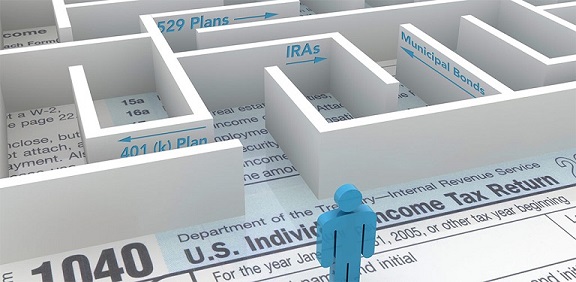Timeless Tips on Tax-Wise Investing - Part I: You and Your Investments
Submitted by Desmond Wealth Management, Inc. on March 29th, 2017
While “tax season” may imply that there is an optimal time to think about your income taxes, the best way to minimize your annual “pay-triotic duty” is to engage in year-round tax-wise investing, with ongoing best practices in:
- Your personal tax-efficient habits.
- Your fund managers’ tax-efficient habits.
- Your investment portfolio’s tax-efficient management.
- Your advisors’ tax-efficient teamwork.
You and Your Investments
There are a number of personal habits you can embrace that make for tax-efficient investing. Here are a few to get you started.
Have a plan... and follow it. Investing according to a plan, preferably in the form of a written Investment Policy Statement, makes everything else we’re about to describe easier to accomplish. By clearly defining and documenting what you plan to achieve with your investments and how you plan to achieve it, you and your financial team are best positioned to ignore the inevitable, often tax-incurring distractions along the way. A detailed investment plan also serves as your reliable guide for resolving any conflicting priorities when balancing tax efficiency versus other considerations within your overall wealth management.
Avoid hyperactive trading. Bottom line: The more trading you do in your taxable accounts, the more “opportunities” you create to be taxed on the proceeds. The fewer trades that are required to accomplish your investment plan, the better off you’re likely to be when taxes come due. (See how that plan is already coming in handy?)
Make good use of tax-sheltered accounts. It stands to reason, the more assets you can hold in tax-sheltered or tax-free accounts such as IRAs, Roth IRAs, 401(k)s, 529 college saving plans and health savings accounts (HSAs), the more opportunities you have to avoid or at least postpone the tax ramifications otherwise inherent in building capital wealth.
Inside Your Investments: Not Every Fund Is Created Equal
Next, consider your individual investments. Let’s say, for example, that your investment plan calls for holding a diversified mix of domestic and international stocks in your taxable accounts. Unless you’re planning to invest directly in thousands of individual securities (which we generally advise against), you will need to choose one or more funds to make up the desired mix. That’s where the challenge begins because, even if two funds share identical investment objectives, one may be considerably better than the other at tax-efficiently managing its holdings on your behalf.
It’s easy for fund managers and investors alike to ignore this important detail because not all dollars lost to a fund’s tax inefficiencies show up in its published returns. Some of them may show up as annual capital gains distributed to fund shareholders (i.e., you), who must pay taxes on the gains at their individual tax rate – whether or not the share value of the fund itself has gone up, down, or sideways.
In his article, “After a Bad Year for Funds, Prepare for a Tax Hit,” Wall Street Journal columnist Jason Zweig reports this particular “gotcha.” When a fund that has dramatically plummeted in value is forced to sell highly appreciated holdings to meet shareholder redemptions, all shareholders must then share the burden of paying taxes on those realized gains, even if the fund value itself has declined. Ouch.
To minimize such scenarios and otherwise soften the blow of your fund’s taxable trading activities, it’s worth seeking out managers who exhibit the best tax-management practices, especially for funds that you plan to hold in your taxable accounts. Following are some traits to seek.
Avoid actively trading funds in favor of evidence-based investing. Just as you should minimize your own hyperactive trading, your fund managers should do the same by heeding the academic evidence on how markets operate. Most managers try to “beat” the market by actively picking individual stocks or forecasting when to be in or out of it. Instead, look for managers who are seeking to build lasting value by patiently participating in the long-term growth expected from the return factors being targeted. Evidence-based investing is not only a more sensible overall approach, it also is typically more tax-efficient.
Avoid hyperactive shareholders. As implied above, it’s best to invest in funds in which your fellow shareholders are less likely to panic-sell during bear markets. Undisciplined investors may force a fund manager to liquidate appreciated holdings to fund their flight, incurring distributed capital gains that you, as a fellow shareholder, must shoulder along with them. Investors who form personal investment plans, adopt an evidence-based strategy, and choose like-minded fund managers to help them implement their plans should be better at retaining their resolve, even during volatile markets. This was evidenced during the 2007–2008 financial crisis; even as countless investors were fleeing the frightening markets to sit on the sidelines, evidence-based fund manager Dimensional Fund Advisors enjoyed investment inflows – people buying into their funds – throughout.
Seek out tax-managed funds for your taxable accounts. Some fund families offer versions of their evidence-based funds that are deliberately tilted toward favoring tax-friendly trading over maximizing gross returns with no regard to the taxable consequences. Tax-friendly trading can include practices such as avoiding incurring short-term (more costly) capital gains and more aggressively realizing available capital losses to offset gains. For additional insights, we recommend reading financial author/BAM ALLIANCE Director of Research, Larry Swedroe’s article, “Start Paying Attention To Tax Efficiency,” which describes a study that quantifies some of the costs and benefits of tax-efficient management.
Next Up: Tax-Efficient Portfolios, Tax-Efficient Teamwork
Beyond the best practices you can adopt within your personal investing and fund manager selection, there are a few more strategies for ensuring excellence in your year-round tax-wise wealth practices. We’ll cover these in the second half of our tax-wise investment series. In the meantime, let us know today if we can assist you with your own tax-wise investing.

